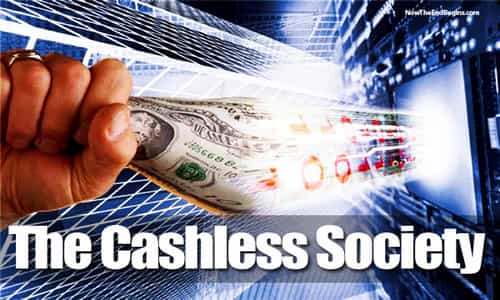Several countries around the world have moved quickly towards cashless societies in the last five years, most notably China and Denmark.
As electronic payment apps, debit cards and credit cards replace paper currency, governments, bank and corporations delight in the level of control this allows them over the population.
The United States has held out longer than other countries, but now has started to show signs that cash, and the freedom it brings, is on the decline. Businesses, from Starbucks to Sweetgreen, are now experimenting with no-cash policies at some locations and debit/credit/app only policies are creeping into other sectors as well.
The Church of England has now adopted electronic payment systems such as Apple Pay, Android Pay and the major credit cards.
Not yet abandoning cash, the introduction of the new payment systems is a response to a social movement that is increasingly rejecting cash.
Though the numbers are not easy to track, the number of young adults who pay their bills, send money to friends, fill up their cars and buy groceries all without touching cash is growing to the point where some financial experts believe that today's teens may, in another decade, be the first cashless generation in the United States.
On March 29th, Visa announced the fifty winners of its cashless challenge contest, which challenges small businesses that now accept only credit card payments to compete for $10,000 prizes. Visa may be awarding $500K a year of its money to small businesses for the simple act of foregoing cash payments, but the investment can have a powerful knock-on effect.
First, the winners are required to explain how going cashless has positively impacted their businesses, which is, in itself, valuable marketing and research data the credit card companies can use to persuade others to abandon physical currency.
Second, the more businesses that go credit-only, the greater the level of acceptance we are likely to see across a broader spectrum of society, resulting in increased credit card use overall and more businesses ditching cash. For credit card companies and banks, collecting fees on every transaction is a powerful incentive to undermine the use of cash.
Businesses cite cost savings from time wasted counting cash, fees paid for armor car services and safety from theft. When cash is created as an object of value that must be counted, stored and transported with care, it is clear how digital payment systems and credit cards can come out ahead.
For individuals, there are no more trips to the ATM and no cash for thieves to grab in a robbery. A recent study sponsored by credit card company Capital One found that 25% of Americans don't carry cash at all any longer and that rises to 33% for adults between 18 and 35.
Just 21% of Americans use cash as their most common form of payment and the average amount carried is a mere $25.
China and Denmark stand out as the two countries moving most quickly away from cash, with India and several other countries not far behind. Denmark favors credit and debit cards while China has skipped cards in favor of app-based digital payment networks such as WeChat.
According to the South China Morning Post, China registered $12.8 trillion of digital transactions in the first 10 months of 2017 alone, a truly staggering figure. The Chinese Communist Party has fully embraced payment apps not just for their efficiency but also the level of control they offer.
Without paper money, every transaction can be tracked, logged and forever linked to every citizen. Under the new social scoring system, purchases that the Communist Party favors will improve one's score, but use your money for video games or vices and your access to jobs, education and loans will dry up.
Legally restricting or banning gun ownership is a tall order in the United States but cutting off the ability to purchase them may not be.
Following the Bush administration's attacks on the credit card processors of pornography sites more than a decade ago, New York's Comptroller, Thomas DiNapoli, appealed in a letter to major banks and credit card companies to block all transactions associated with firearms.
Today, if credit cards and banks refused transactions involving firearms or ammunition an individual could simply pay in cash, but once physical currency has been eliminated such purchases will require the permission of both corporations and government.
A system of loyalty or mark to a government ruler that controls your ability to buy or sell is exactly what is described in the book of Revelation and is often referred to as "the mark of the beast". Those who like to dismiss the book of Revelation as mere allegory may want to take another look.
 By PNW Staff April 19, 2018
By PNW Staff April 19, 2018
 By PNW Staff April 19, 2018
By PNW Staff April 19, 2018